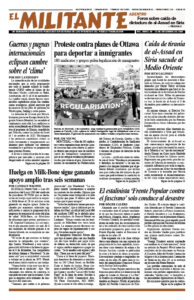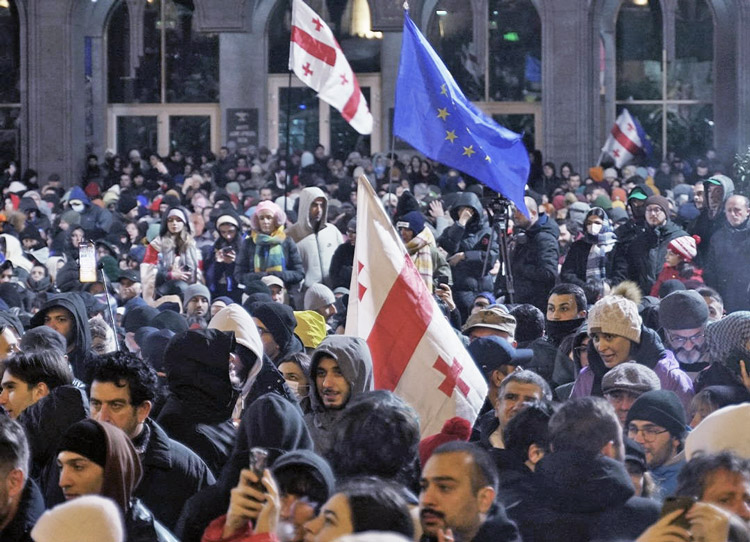Tens of thousands of demonstrators continue to protest across Georgia after the pro-Moscow Georgian Dream government announced plans Nov. 28 to postpone talks on joining the European Union until at least 2028. Undeterred by brutal attacks from security forces, protesters have turned out daily in Tbilisi, the country’s capital, and dozens of other cities, including Batumi, Kutaisi, Rustavi, Zugdidi and Telavi.
Police have been using increasing force in the regime’s drive to end the demonstrations, which center on the parliament building in Tbilisi. More than 300 protesters have been arrested and over 100 people injured, as riot police use water cannons and tear gas against the crowds, beating scores of demonstrators. Police raided the offices of several opposition parties, with one video showing cops dragging the leader of Coalition for Change into a police car.
“The first days were the hardest, everyone was there as an individual, now we are more organized,” protester Ruso told the Militant in a phone interview Dec. 9. “If attacked, we move to another street, but often there are thugs organized by the government waiting in cars. They show no remorse and are much worse than the SWAT teams. They also focus on the media, trying to destroy any evidence, any photos.”
Lazare Maglakelidze described to the New York Times how he was snatched by men in unmarked black uniforms, dragged into a van and beaten. He said he wasn’t giving up and found parallels between the protests and the 2014 Maidan uprising in Ukraine. “Ukraine is where we see people fighting for their dignity, dedicating their lives to the highest of high concepts that anybody can imagine,” he said.
Protesters have answered the attacks with more marches, with demonstrators carrying signs saying, “We demand free and fair elections” and “Free all unjustly arrested.” Several hundred media workers marched down Tbilisi’s central Rustaveli Avenue Dec. 8, putting up posters of colleagues they say have been attacked.
Protesters are demanding a rerun of the October elections, which they say were rigged. The Georgian Dream government, which has been in office for 12 years, was formed and bankrolled by Bidzina Ivanishvili, a multibillionaire capitalist with banking and steel interests in Russia. “We didn’t need to hear the election results to know what they would be,” Ruso told the Militant. “People could see who you voted for. People with government jobs — teachers, bus drivers — would risk their jobs for voting the wrong way.
“And Georgian Dream urged us to not create another Ukraine, using a poster showing bombed-out buildings there. Neighbors would say, ‘I hope you voted for peace,’” she said.
Prime Minister Irakli Kobakhidze has vowed to “eradicate” what he calls “liberal-fascist” opposition, echoing language used by the Vladimir Putin regime in Moscow to target political opponents. He accused the demonstrators of organizing a repeat of the Maidan revolution that ousted pro-Russian president Viktor Yanukovych in Ukraine. He insists the fight is “already over,” and that protest leaders will be brought to justice.
No retreat
But protesters continue to gather outside parliament, with no signs of retreat. The actions follow months of rising tensions. After tens of thousands took to the streets in early 2023, the government initially backed off from imposing another Russian law — a “foreign agents” statute that would curtail political rights and limit freedom of the press. In April 2024 some 20,000 people, mainly young, protested in Tbilisi, chanting, “No to the Russian law!” Despite widespread opposition, parliament passed the bill in May.
Many people see the current protests as an important moment in the history of Georgia’s long fight for independence. After fostering groups of pro-Moscow separatists, beginning in the early 1990s in the regions of Abkhazia and South Ossetia, Moscow invaded Georgia in 2008, taking control over the two areas with Russian troops stationed in both.
Georgia was originally annexed by Russia’s reactionary czarist regime in 1801 and only gained its freedom following the Bolshevik-led Russian Revolution in 1917. That workers and farmers government freed Georgians and other oppressed people from the czarist boot, guaranteeing their right to self-determination. This conquest was later reversed by the counterrevolution in Russia led by Joseph Stalin.
Georgia, a country of 3.7 million people, declared independence again in 1991 when the Stalinist regime collapsed. There is widespread opposition in Georgia to Moscow’s invasion of Ukraine.
“Now there are protests in other cities, even in small towns and some villages,” Ruso said. “This is unheard of here in Georgia. We say, where you live, you can protest.”


